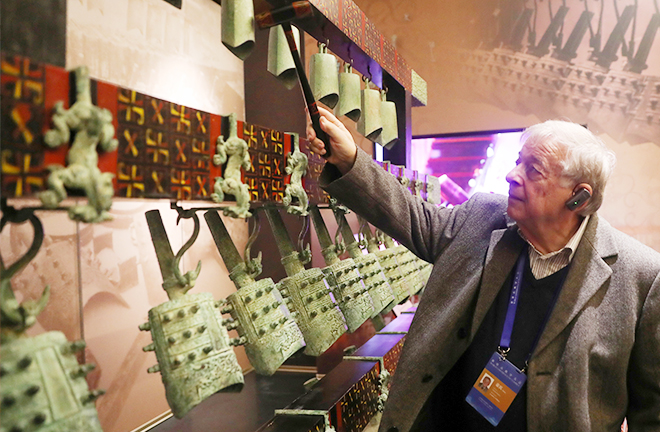Classical civilizations illuminate modern society

A foreign classicist plays bianzhong, or bronze chime bells, at the Chinese Archaeological Museum in Beijing on Nov. 6, 2024. Photo: IC PHOTO
Throughout the long course of human history, diverse civilizations have served as beacons, illuminating the path forward for humanity. From the pyramids of ancient Egypt to China’s Four Great Inventions—papermaking, gunpowder, printing, and the compass, from ancient Greek philosophy to Indian Buddhist culture, classical civilizations have laid a solid foundation for human advancement with profound thoughts and remarkable achievements, while continuing to influence every aspect of modern society.
To explore the contemporary relevance of classical studies as well as the past and future of inter-civilizational exchanges and mutual learning, CSST recently interviewed Abdul Aziz Hamdi, head of the Chinese Language Department at Al-Azhar University in Egypt, and Anil Kumar Singh, an assistant professor of Greek studies from the School of Language Literature & Culture Studies at Jawaharlal Nehru University in India.
Value of classical civilizations
Classical studies open a window into the wisdom of ancient civilizations, offering insights into the profound philosophies, political systems, cultural achievements, and even daily life of past societies. Beyond their immense historical value, such studies carry undeniable contemporary significance.
According to Aziz, mastering classical knowledge is invaluable for understanding and influencing the course of human civilization. He noted that ancient societies achieved remarkable advancements in fields such as science, technology, art, and philosophy. Taking ancient Egypt as an example, he pointed out that the construction techniques of the pyramids remain an enigma, while the sophisticated embalming methods used in mummification continue to inspire admiration. Similarly, ancient China nurtured numerous scientific and technological breakthroughs, with underlying wisdom that still warrant in-depth exploration.
The literary and cultural development of China, a time-honored civilization, was deeply influenced by classical cultures. Since antiquity, Chinese literature has continuously evolved through both the inheritance and innovation of classical cultures, shaping distinctive literary and aesthetic systems, Aziz said. Classical literature has not only provided a vast reservoir of material and inspiration for modern Chinese literature, but has also exerted a lasting influence on the latter’s values and perspectives on life. Apart from literature, accumulated wisdom from the past continues to play a significant role, even in modern scientific and technological development.
Some dismiss classical civilizations and their achievements, arguing that history holds little value. Aziz strongly disagreed, contending that in this era of rapid modernization, the importance of looking back at history should be even more pronounced. Examining the past allows for a deeper understanding of present social realities and developmental trends. This insight has been consistently validated in China’s long history, where the longstanding tradition of “taking history as a mirror” underscores the importance of drawing lessons and wisdom from the past.
Inter-civilizational exchanges matter
Since ancient times, civilizations have interacted with and influenced one another, integrating elements from different traditions. The great civilizations of the East, including China and ancient India, as well as those of the West, such as ancient Greece and Rome, and the Middle East, including ancient Egypt, all absorbed knowledge and ideas from others while contributing their own wisdom and achievements to the world. These exchanges, transcending both time and geography, have not only enriched cultural diversity but also driven social progress.
Aziz held that delving into the history of exchanges and mutual learning among ancient civilizations is of great significance. Citing the Four Great Inventions of China as an example, he said that the influence of these innovations reached far beyond Chinese borders for centuries. In addition, the works of French literary giant Voltaire were profoundly influenced by Chinese literature. His notable play “Orphelin de la Chine” (“Orphan of China”) was inspired by the Chinese Yuan-Dynasty zaju opera “The Orphan of Zhao.”
Chinese culture has left a lasting impact not only in Europe but also in the Arab and Islamic worlds. In fact, the dialogue between Chinese and Egyptian civilizations has been unfolding for centuries. Aziz mentioned renowned late Qing-Dynasty scholar Kang Youwei, who traveled extensively, including to Egypt, where he recorded unique insights into Egyptian civilization through his keen observations and writings.
From comparative perspectives, Aziz said that Egyptian civilization originated from the Nile while China’s rose from the banks of the Yellow River. The interaction between water and human societies has given rise to creativity, art, knowledge, and civilization. Egyptian classical culture was deeply intertwined with religion, reflecting reverence for the divine and a longing for the afterlife. In contrast, Chinese civilization has been closely linked to philosophy, focusing on the relationship between humanity and nature, the individual’s role and responsibilities within society, and the principles of state governance and social harmony. This human-centered philosophical tradition has endured across generations and continues to exert influence today.
A scholar devoted to comparative studies of India and Greece, Singh was deeply impressed by Chinese academia’s progress in classical studies after being invited to the inaugural World Conference of Classics in Beijing, China, held in early November 2024. During his first trip to China, Singh’s visits to museums in Henan Province and exposure to local historical and archaeological findings not only enriched his knowledge but also offered him a new perspective on the world.
Singh told CSST that he intended to expand his research framework from Indo Hellenic to Chinese Hellenic, since Chinese texts, such as those recorded by Chinese monks in the 6th century, provide key references for Indians to deepen their understanding of Indian history.
Discussions on the East-West relationship essentially revolve around the connections between the philosophies of Shakyamuni, Confucius, and Laozi and those of Socrates, Plato, and Aristotle, as well as the core value systems these sages established in their respective cultural spheres. Singh concluded that comparing these two philosophical traditions would generate new insights capable of guiding the world toward a better future.
Edited by CHEN MIRONG
